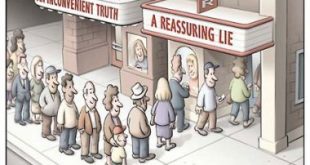from Thomas Palley A journalist sent me some questions about MMT. My answers are below. 1. What are the major flaws you see within Modern Monetary Theory? (A) I like to say that MMT is a mix of “old” and “new” ideas. The old ideas are well known among Keynesian economists and are correct, but the new ideas are either misleading or wrong. The essential old idea, which everybody knows, is government has the power to issue money. We used to talk of “printing” money. In today’s electronic...
Read More »How to get published in top economics journals
from Lars Syll By the early 1980s it was already common knowledge among people I hung out with that the only way to get non-crazy macro-economics published was to wrap sensible assumptions about output and employment in something else, something that involved rational expectations and intertemporal stuff and made the paper respectable. And yes, that was conscious knowledge, which shaped the kinds of papers we wrote. Paul Krugman More or less says it all, doesn’t it? And for those of us...
Read More »Why should the poor pay high drug prices?
from Dean Baker We have seen a lot of hyperventilating in political circles over Donald Trump’s recently proposed tariffs on steel and aluminum. While these do not seem like well-considered policies, and are likely to do more harm than good even from the narrow standpoint of increasing manufacturing employment, they are not by themselves the horror story being presented. Steel prices often fluctuate by 20 or 30 percent over the course of a year, as they did in 2016. If tariffs raise the...
Read More »Keynes vs. Keynesianism
from Lars Syll But these more recent writers like their predecessors were still dealing with a system in which the amount of the factors employed was given and the other relevant facts were known more or less for certain. This does not mean that they were dealing with a system in which change was ruled out, or even one in which the disappointment of expectation was ruled out. But at any given time facts and expectations were assumed to be given in a definite and calculable form; and...
Read More »Disagreeing with Krugman: Is China stealing knowledge?
from Dean Baker I would agree with pretty much all of Paul Krugman’s criticisms of Donald Trump’s trade war with China, but I would strongly disagree with one of his criticisms of China. He tells readers: “In some ways, China really is a bad actor in the global economy. In particular, it has pretty much thumbed its nose at international rules on intellectual property rights, grabbing foreign technology without proper payment.” The issue here is who set the rules and what is proper...
Read More »“Capitalism was built on the exploitation and suffering of black slaves and continues to thrive on the exploitation of the poor”
from David Ruccio 50 years ago, Martin Luther King Jr. was assassinated, just days after joining a march of thousands of African-American protestors down Beale Street, one of the major commercial thoroughfares in Memphis, Tennessee. King and the other marchers were demonstrating their support for 1300 striking sanitation workers, many of whom held placards that proclaimed, “Union Justice Now!” and “I Am a Man.” The night before his assassination, King told the striking sanitation...
Read More »The efficient market hypothesis — pseudoscientific mumbo-jumbo
from Lars Syll The efficient market hypothesis — EMH — argues there is no free lunch and prices are ‘right.’ Well, as we all know, that is not true. Noise does influence asset prices and the law of one price is blatantly violated again and again. Of course, THERE ARE IDIOTS, as Larry Summers once (in)famously put it. When visiting Chicago, look around … The price is often wrong, and sometimes very wrong … If policy-makers simply take it as a matter of faith that prices are always right,...
Read More »Watch the boulder
from Peter Radford There’s a bold rolling down the hill. We are watching it carefully. It is accelerating. It is enormous. It will mow us down. Lives will be lost. Or at least livelihoods will be lost. People will suffer. The boulder is terrifying. But, hey, let’s keep watching. That’s about the attitude of the people who keep on talking about the imminent tsunami of automation, AI, and other so-called disruptive technologies. Let’s keep watching because it’s bad — really, really, bad....
Read More »Glenn Loury & Dean Baker [The Glenn Show]
00:16 Why Dean is moderately optimistic on the economy 02:28 Will the minimum wage go up? And will it matter? 09:11 The forces behind wage stagnation 12:21 We import Chinese goods, why not import Indian doctors? 14:41 Dean: More education for workers isn't the (only) answer Glenn Loury (Brown University) and Dean Baker (Center for Economic and Policy Research, Beat the Press) Join the conversation on Bloggingheads.tv: http://bloggingheads.tv/videos/32066 Recorded on November 12, 2014...
Read More »Pinioned Edition | Dean Baker & Brink Lindsey
00:46 Dean doesn't foresee a double-dip recession 03:36 Could Europe's debt crisis lead to a new financial meltdown? 11:53 Work-sharing as a way to cut unemployment 29:51 Brink: Bernanke is abdicating his responsibility 41:41 GOP inflation phobia and Obama's monetary failure 49:16 Heart surgery in Thailand as a cure for Medicare Dean Baker (Center for Economic and Policy Research, Beat the Press) and Brink Lindsey (Cato Institute, The Captured Economy) Join the conversation on...
Read More » Real-World Economics Review
Real-World Economics Review






